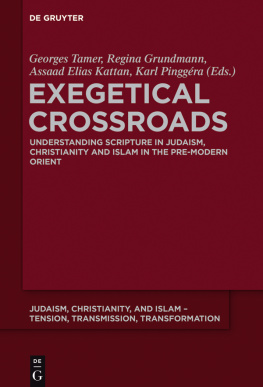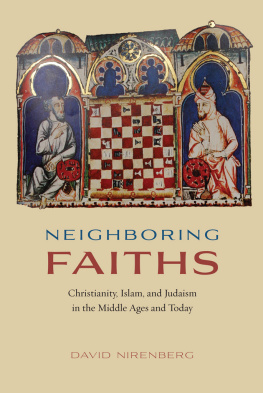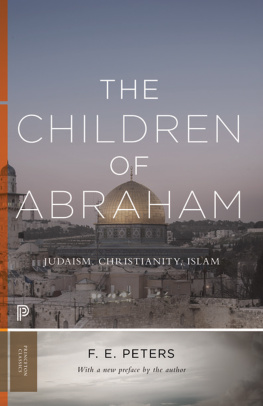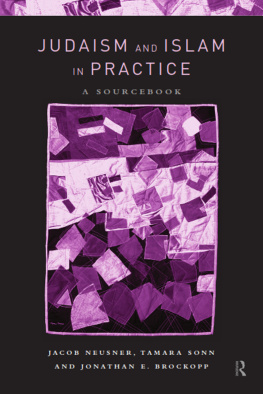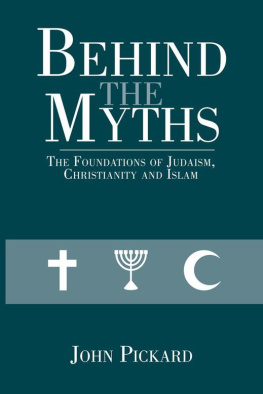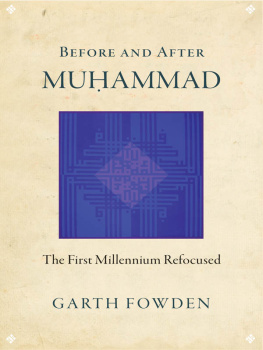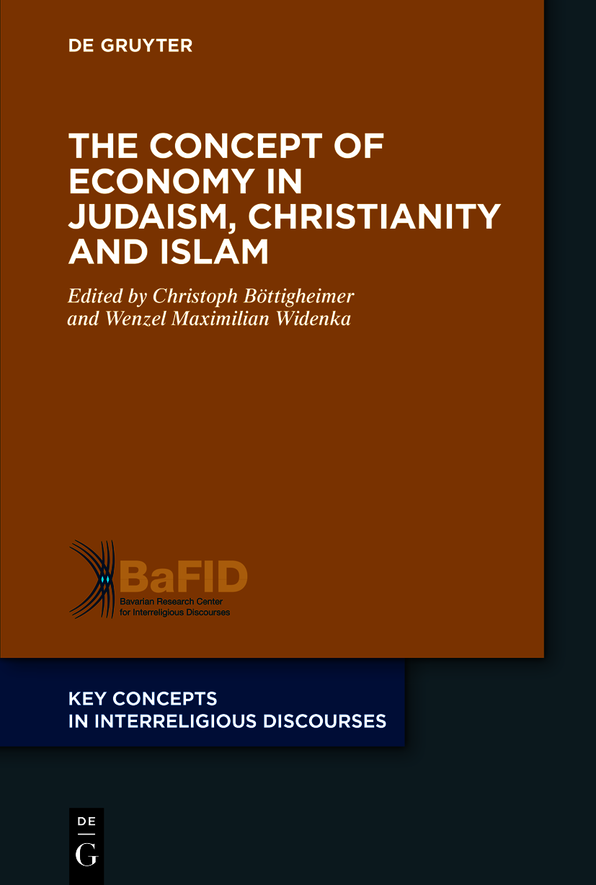Key Concepts in Interreligious Discourses
Edited by
Georges Tamer
Asma Afsaruddin
Kenneth Seeskin
Christoph Bttigheimer
Patrice Brodeur
Nader El-Bizri
Ghassan El-Masri
Elisabeth Grb-Schmidt
Assaad Elias Kattan
Elke Morlok
Manfred Pirner
Volume
ISBN 9783110782301
e-ISBN (PDF) 9783110782486
e-ISBN (EPUB) 9783110782684
Bibliographic information published by the Deutsche Nationalbibliothek
The Deutsche Nationalbibliothek lists this publication in the Deutsche Nationalbibliografie; detailed bibliographic data are available on the Internet at http://dnb.dnb.de.
2023 Walter de Gruyter GmbH, Berlin/Boston
Foreword
Reinhard Cardinal Marx
Today we are facing the demanding challenge of globalised goods-, labour- and financial markets as well as an economisation of all spheres of life. Religious communities, too, are not able to fully elude this process of a economisation of life worlds (J. Habermas), but they are able to critically reflect on this process and actively shape it; perhaps, where it is necessary, also with a prophetic resistance when there are aberrations and fundamentally wrong positions. First and foremost, they have to emphasize and demand again and again that labour, economy and profit are not ends in themselves, but rather means to serve the well-being of all people. They are means to a fulfilled life. The centre is the human person with his or her dignity, but also responsibility. Since economics is a social science, it is about human agency under the conditions of shortage. Without an ethical perspective, without an orientation towards values, this is impossible
The prophetical religions, the religions of revelation, do not consider the field of economy to be a space free of ethics: Already in the Torah and the prophets of Israel a criticism of social and economic deficiencies based on Gods justice can be encountered and not only regarding the people of Israel but already with a universal perspective. Calling for a work-free day in the week, the Shabbat, was in itself revolutionary and has to be defended again and again today. The prophets were also early aware of the close connection between justice and peace between humans and peoples (cf. Ps 85, 11). Jesus teachings contain criticism of the pure pursuit of profit and too much wealth (cf. Mt 6, 24; Lk 6, 34; Lk 16, 13), because these could destroy the proper relationship with God and between people. Islam, emerged in an environment shaped by trade, has principally a positive approach towards the economic dimension and even towards wealth, but decisively criticises excesses, aberrations and injustices in the social and economic life of these times.
The prophets focus especially on the poor, the weak like widows and orphans, the losers in social and economic events and thus become their advocates because God himself solidarizes with the weak and poor. Judaism, Christianity and Islam demand almsgiving: a mandatory social contribution is actually one of Islams five pillars of religious practice. However, it is about more than mere charity: the Bible and the Koran focus on justice, meaning acting according to community that has its model in God himself. Thus, justice became one of the fundamental pillars of Christian social teaching that evolved from the 19th century onwards as an answer to the social question. Christian social teaching is not only concerned with individual agency but also with changes in social, economic, legal and political structures. It is here where I see common challenges and tasks for the religions. The model of a social and at the same time ecologically sustainable market economy could be a comprehensive concept for all religions that is surely to be respelled anew repeatedly. The religions could each contribute their own valuable accents, thus enriching one another. Active advocacy for workers rights, fair pay, equal opportunities for participation and education, the fight against exploitation, corruption, usury, the waste of resources and destruction of the environment have to be mutual concerns, not only at a national, but also on a global level. Concerning welfare, the religious communities could perhaps cooperate more than they have done so far. Globally, especially regarding climate justice, we are speaking of an orientation towards the global common good, i.e. the life of all people, indeed the whole creation.
For the benefit of all people, Judaism, Christianity and Islam want to and should provide a critical yet constructive contribution to a positive development of the actually existing national and global economic order, but in doing so they have to set a good example themselves. At the same instance, they will always remind us that a perfectly just and peaceful order on earth always remains an ideal to strive for, and whose fulfilment has an eschatological quantity.
May this collection of essays on economic and social ethics from the perspective of the three abrahamitic religions be a contribution that initiates the necessary reflexions and discussions needed and encourages concrete action.
I want to thank the editorial team and the contributors for the important impulse and the commitment to explore and present the mutual contribution of the religions to the central questions of our time.
Reinhard Cardinal Marx,
Archbishop of Munich and Freising
The Concept of Economy in Judaism
Moses L. Pava
Yeshiva University
The Meaning of Wealth in the Bible
1.1 Covenanting in the Wilderness
Wealth, like life itself, is a sacred gift from God. Ideally, it is to be maintained, equitably shared, and, in turn, handed off to the next generation. Its annual fruits, born only through caring cultivation and the sweat of your brow (Genesis 3:19), are to be fully savored and enjoyed, shared, and celebrated, especially among family and community during Sabbath and communal holy days. Wealth is a this-worldly, tangible gift, given by God with the sole purpose of enhancing everyday human experiences. It is a wonderful gift lovingly received in the context of several covenants between God and Israel, most significant of which is the brit or covenant at Sinai (we will do and will listen Exodus 24:7). The brit defines the meaning, responsibilities, and appropriate uses of wealth.
Wealth, as a gift of God, is a central and compelling value in the Mosaic social vision. Wealth satisfies human needs, but it also elevates human dignity and provides the connective tissue of the Israelite community. Wealth, here, is not imagined as part of a utopian society, Eden on earth did not work, but it is promised as an important element toward building a meaningful and sustainable society.
While wealth is a central value, it is just one component in a set of equally compelling Torah values. These include freedom (from slavery), loyalty to the covenant, obedience to the law, peace, justice, mercy, charity, kindness, humility, the Israelite people as a whole, tribe, family, memory, love of God, love of the neighbor, and even love of the stranger. And, it is the singular and paramount value of edushah or holiness that weaves together these values into the tapestry of an imagined holy people working, living, and worshipping peacefully in a holy land, in perpetuity. You shall be to Me a kingdom of priests and a holy nation (Exodus 19:15). Such a society is to serve as a post-Edenic wholistic model for other nations to emulate, a light unto the nations (Isaiah 49:6), a just society that has no knowledge or need of separate economic or, even, political spheres.


